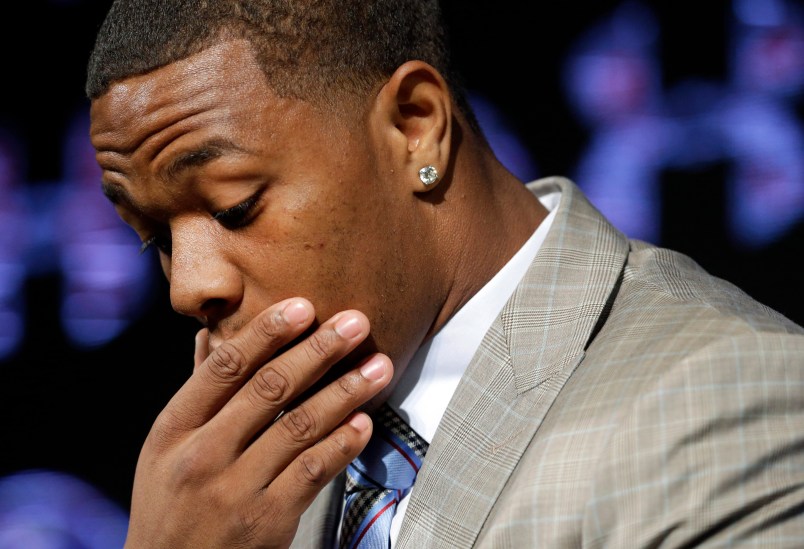In an early scene from 1993’s Aladdin, the title character is running from the palace guards after stealing a loaf of bread, frenetically weaving to avoid their pursuit. A neighbor remarks, “Getting in trouble a little early, aren’t we, Aladdin?” He retorts: “Trouble? No way. You’re only in trouble if you get caught…”
Less than a second later, he is grabbed by the vest, pulled face to face with the snarling captain. “GOTCHA!” Aladdin’s response? A yelping, “I’m in trouble!”
After reports revealed late on Wednesday that the NFL had the video of Ray Rice allegedly punching his then-fiancee out cold in April — but it was not revealed to the public until this week — this exchange continued to come to mind. For an incident that happened so long ago, and that the NFL seems to have known about, why is it only now affecting his playing status?
Tweeter and Daily Beast columnist Joshua DuBois said it far better than most of us ever could when he opined:
“Remember, Ray Rice was not cut because they saw that video. He is cut because you saw that video.”
— Joshua DuBois (@joshuadubois) September 8, 2014
And he is absolutely correct. 2014 has been a year of high-profile sanctions following, not initial transgressions over domestic violence or racism (as was the case with the Clippers’ Donald Sterling), but the public discovery of these events. It would appear that the social violation is not enough to terminate ownership or participation, but the public reaction to these issues is.
Consider, in contrast, the reaction to Lance Armstrong’s public admission of doping in January of 2013. Were sanctions made? Yes, and medals were stripped, foundations reassigned. But the vitriol surrounding the proceedings was considerably less when the admission came from the transgressor, than when it is discovered by sites like TMZ or Daily Beast. Think about the case of Atlanta Hawks’ owner Bruce Levenson, who is voluntarily selling his team after again, voluntarily, reporting a racist email that he sent in 2012. Where Sterling’s public reception was explosive, Levenson’s has barely caused a spark.
Is it failure to disclose our own bad behavior that so rankles the good humor of the public? Take, as an unrelated example, the recent iCloud leak that spilled the private photos of stars like Jennifer Lawrence and Kate Upton for the world to see. Would the reaction have been as riotous if Lawrence, Upton, or other affected parties had simply come forward sharing these photos? Behavior like risque photo taking, domestic violence, or even racism, happen far more often than we’d like to admit. As one ThinkProgress columnist said in response to the photo leak:
That’s the thing: this is news, because it happened to Jennifer Lawrence. But these kinds of violations happen to all kinds of women, all the time. I don’t think I am alone in reading this not as a scoop on a star but as one of the only times that, in fact, celebrities are “just like us.” If it can happen to her, it can happen to us […] (emphasis added)
But in daily life, these behaviors, varying in their levels of social violation, are unspoken. When they’re shared openly, we’re less likely to be shocked. But when someone else shares that news? We’re outraged.
To borrow a reference from the Nick at Nite era, Bewitched’s Edith Kravitz was nervous about the supposed witchcraft at the Stevens house because she wasn’t sure. If the Stevenses had walked across the street and announced that Samantha was a witch, how would she have reacted? And to return to our original reference, perhaps it wouldn’t have been the palace guards that sealed Aladdin’s fate in the present time; it probably would have been the observant neighbor. And her neighbors. And her thousands of Twitter followers.
And let’s not even think about what could have happened if TMZ had gotten involved …
Amma Marfo is a writer, higher education administrator, and popular culture enthusiast dedicated to the idea that our leisure pursuits can inform and enrich the work we do. She writes often for her own blog (“The Dedicated Amateur“) and is a contributing editor to the Niche Movement. Her first book, THE I’S HAVE IT: Reflections on Introversion in Student Affairs, was released in January 2014. Her other interests include running, yoga, surfing, trivia, comedy, and gluten-free cooking/baking. You can follow her on Twitter @ammamarfo.







Absolutely!
The NFL had these tapes (and probably others) for over 4 months and thought they could keep one of their cash-cows if it could be covered up.
TMZ Sports blew their cover and now they must pay.
I guess I don’t find it very shocking or even outrageous that the NFL and other sports organizations put profit before moral considerations. What else would we expect from them? These are money making machines; when not directly opposed to morality they are by their nature indifferent to it. The only thing outrageous is that the right wing continues to trumpet the myth that the system of unfettered capitalism is somehow at the basis of morality.
Does it hurt to ask such stupid questions?
Back during Watergate, the people involved tried to say that others were doing the same thing, and they were. The only problem was that they got caught.
Same with Ray Rice.
Nah, it’s probably like being high.
This is, bar none, the dumbest, worst-written article I’ve ever seen on TPM.